
Introduction
The UK is currently grappling with an unprecedented heatwave, as temperatures soar to record-breaking highs this September 2023. With climate change becoming increasingly evident, the impact of such weather patterns affects not only the environment but also public health, infrastructure, and lifestyle across the nation.
Current Heatwave Conditions
The latest reports from the Met Office indicate that several regions, including London, the Midlands, and Southeast England, have recorded temperatures exceeding 30 degrees Celsius (86 degrees Fahrenheit). While these figures are not uncommon for a summer, the fact that they are occurring this late in the season has surprised many. Notably, the heatwave was expected to reach its peak over the weekend, with forecasts predicting that some areas could even experience highs of 34 degrees Celsius (93 degrees Fahrenheit).
This surge in temperature has led to several heat-related advisories, urging residents to stay hydrated and avoid prolonged exposure to the sun. Numerous local councils have implemented measures to assist vulnerable populations, particularly the elderly and those with pre-existing health conditions.
Consequences of the Heatwave
As temperatures rise, the heatwave is having tangible effects on daily life across the UK. Though the sun has attracted many to parks and beaches, it has also strained the National Health Service (NHS) with an increase in heat-related illnesses. Emergency services have reported a surge in call-outs related to heat exhaustion and dehydration.
Moreover, local farmers are expressing concerns about the impact on crops as prolonged heat can diminish yields and affect quality. The agricultural sector, still recovering from recent flooding, is now faced with the challenge of balancing extreme weather conditions across the spectrum.
Conclusion
This heatwave serves as a stark reminder of the ongoing changes in our climate and the increasing volatility of weather patterns. While the immediate effects are being felt nationwide, climate scientists are predicting that such events could become more frequent. Residents are advised to prepare for potential future heatwaves by ensuring they stay informed about weather forecasts and following local health guidelines.
In summary, as the UK endures this unusual September heatwave, the significance of these extreme temperatures underscores the urgent need for discussions around climate resilience and sustainable practices to mitigate the impact of future weather extremes.
You may also like
Current Weather in Manchester: What You Need to Know

Understanding the Importance of AccuWeather in Daily Life
